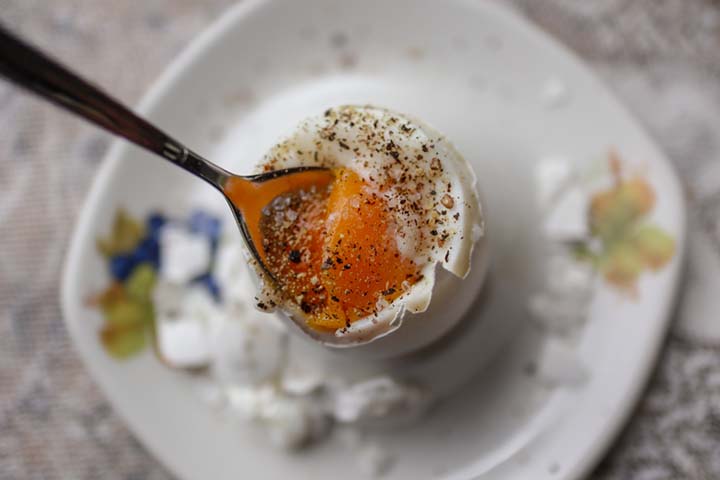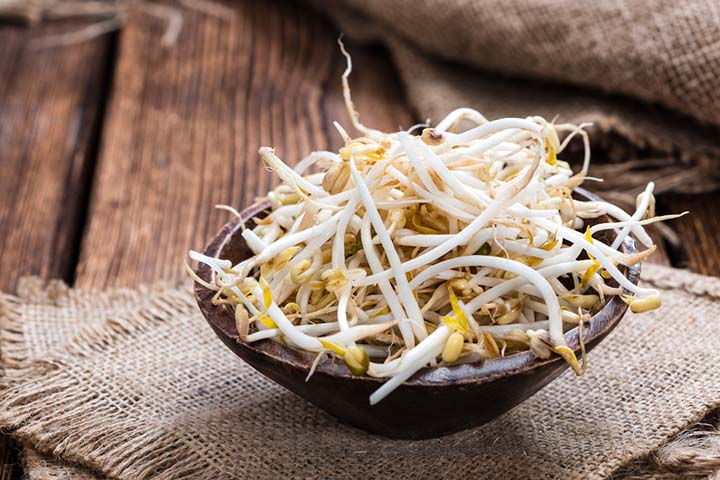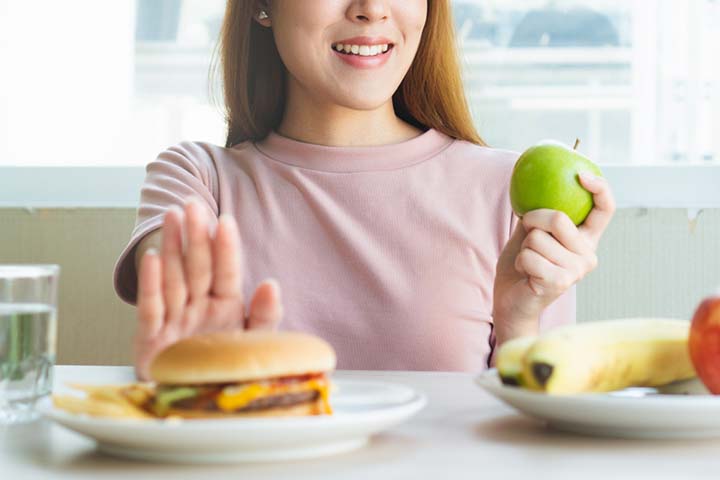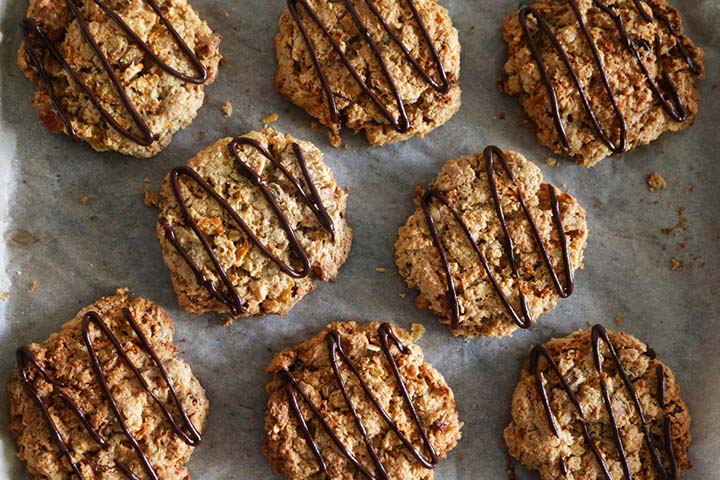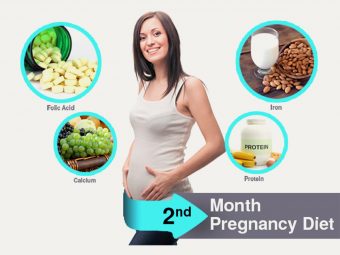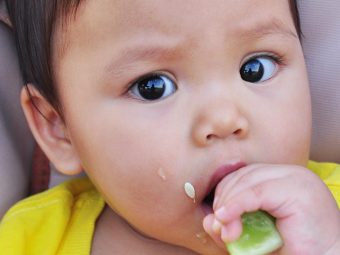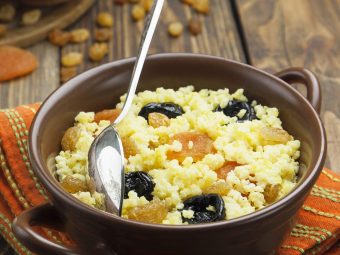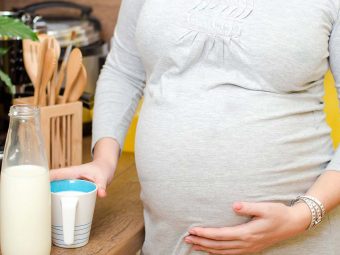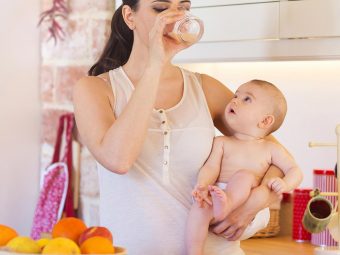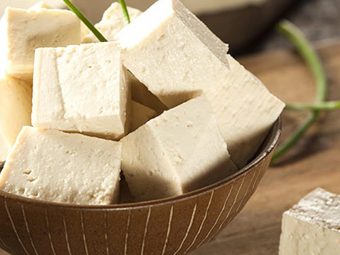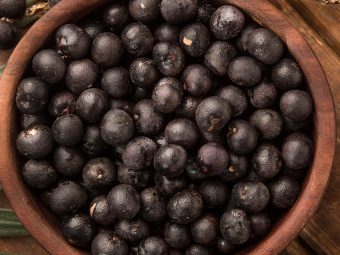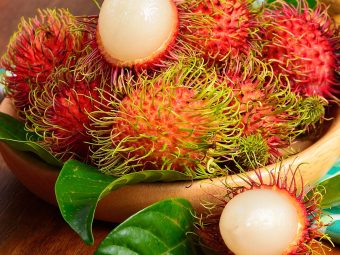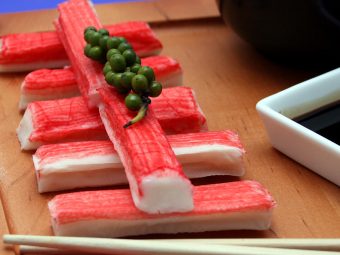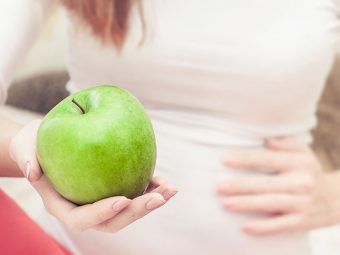
Image: iStock
As an expecting mother, you would be told to include certain foods in your diet that are beneficial for you. However, we have included a list of foods to avoid during pregnancy to help you stay safe. Pregnancy is accompanied by numerous physical changes, affecting the baby’s growth in many ways. When it comes to diet, pregnant mothers need to make sure they have enough nutrition to sustain the baby’s healthy development while staying nourished. Sometimes, certain foods that you may have been eating before pregnancy become unsafe for consumption during pregnancy for several reasons. You may be wondering what not to eat during pregnancy. So, our post can help you explore the different foods that you need to avoid during pregnancy, their reasons, and safe alternatives.
Foods To Avoid During Pregnancy
Avoiding some foods ensures that you and your baby are safe and healthy. Below, we give a list of foods to avoid in first month of pregnancy and also during other months.
1. Fish containing mercury:
Fish such as shark, swordfish, king mackerel, and tilefish have high mercury levels and must be shunned. Mya Bellinger, a qualified medical practitioner, specializing in internal medicine, immunology, and gynecology, says, “Pregnant women should avoid fish that contain mercury, raw meat like sushi, and organ meat.” Mercury, an element found in oceans, streams, and lakes, converts into methylmercury in the human body. It is a neurotoxiniXToxic substance that negatively impacts the functioning of the nervous system and is linked to brain damage and developmental delays in babies. You could choose fish such as salmon, catfish, cod, and canned light tuna, which have low mercury levels. According to the US FDA, you can eat up to eight to 12 ounces of fish per week, which is two to three servings. Consumption of white tuna (albacore) should be limited to six ounces per week (1).
Solution: Choose fish rich in omega-3 fatty acidsiXEssential fatty acids obtained through a diet that the human body cannot synthesize on its own and low in mercury as the high protein, low saturated fats, and many essential nutrients contribute to the child’s heart and brain development, and aid in proper growth. You should, however, check with a doctor or a qualified dietitian to know about the fish you can eat.
2. Smoked seafood:
Do not take smoked and refrigerated seafood, which are labeled as lox, jerky, nova style, and kippered as they contain Listeria monocytogenes bacteria. This bacteria causes listeriosis (associated with symptoms such as diarrhea and vomiting) that could lead to illness in newborns and even miscarriage or stillbirth. According to the Centers for Disease Control and Prevention (CDC), pregnant women are ten times more prone to contract listeria infection than others. Moreover, processed seafood contains high levels of salt which can lead to increased blood pressure and swelling of the body parts (2).
Solution: You may have canned smoked seafood occasionally or when fresh fish is unavailable. However, avoid such food as much as you can.
3. Fish exposed to industrial pollutants:
Fish from local streams, lakes, and rivers contain harmful levels of polychlorinated biphenylsiXIndustrial chemicals that have carcinogenic properties (PCBs). Exposure to these contaminants might hamper fetal health, which might lead to low birth weight of the baby, smaller head size, learning disabilities, and memory problems. Avoid eating locally caught striped bass, pike, bluefish, salmon, trout, and walleye.
Solution: You can choose fresh water fishes.
Also, follow a few tips when picking fish from a local stream, lake, or river. Firstly, check the advisories related to that water body. You can get the information from the fishing regulations websites or at a local health department. This information would be regarding fish caught from local waters and not the ones available at local groceries. Avoid raw fish as it is more likely to contract food borne diseases (3).
4. Raw shellfish:
Avoid eating raw shellfish such as oysters, clams, and mussels to stay away from seafood-borne illnesses and food poisoning. They contain harmful bacteria, viruses, and toxins that will make you ill.
Solution: Instead you can eat cooked shellfish ensuring that you cook them with their shells open (2).
5. Raw or undercooked eggs:
Image: Shutterstock
You should not eat raw, undercooked, or soft-boiled eggs as they contain harmful salmonella bacteria which cause food poisoning. You may experience diarrhea, severe vomiting, headache, abdominal pain, and high temperature. All these symptoms are unlikely to harm your baby, but your immune system will become weaker, which may impact the baby’s development.
The foods that contain raw egg and must be avoided are: homemade Caesar dressings, custards, ice creams, mayonnaise and Hollandaise sauces, Béarnaise sauce, Aioli sauce, desserts including mousse, tiramisu, and meringue.
Solution: Buy pasteurized egg products. You can choose commercially manufactured ice cream, mousse, eggnog, and dressings. Eat cooked eggs that contain firm yolks or a well-cooked omelet, and salads (4).
6. Raw meat and poultry:
Having raw or undercooked meat and poultry, such as pink or raw meat that is bloody, can pose a threat as it contains Toxoplasma parasiteiXToxoplasma gondii is the protozoan parasite causing an infection called toxoplasmosis and harmful bacteria Salmonella. Salmonella increases the risk of food poisoning. Toxoplasma causes toxoplasmosis that has flu-like symptoms developing a few weeks after consumption of the food. It can lead to miscarriage or fetal death during delivery.
Solution: You must have well-cooked and hot meat and poultry. Eat home-cooked varieties where the temperature should be around 160°F for ground meats, 145°F for whole cuts, and 165°F for chicken breasts (5).
7. Deli meats:
You should avoid deli meats, also called ready-to-eat meats, such as sandwich meat, cold cuts, lunch meat, hotdogs, and sliced meats. They are known to contain listeria bacteria, which can readily move from the mother to the placenta causing serious complications including fetal death.
Solution: Pasteurization and cooking at a high temperature kill listeria. Thus, you should eat deli meats only after reheating until they are steaming hot (6).
8. Unpasteurized milk:
It is unsafe to drink unpasteurized or raw milk during pregnancy. It has no nutritional advantage, and raw milk and its products account for a higher proportion of food-borne diseases. They contain harmful bacteria such as salmonella, listeria, E.coli, and cryptosporidium that can be dangerous to you and your baby (7).
Solution: Buy pasteurized milk and its products only. In pasteurization, the milk is subjected to a high temperature that kills the disease-causing microbes. If you are buying milk from a local vendor, boil the milk well as high-temperature boiling kills the microbes. You can also choose non-dairy milk such as soy milk, rice milk, almond milk, and oat milk as they are safer and contain similar nutrition.
9. Soft cheeses:
Do not eat soft cheeses such as Camembert, Roquefort, Gorgonzola, brie, feta, blue cheese, queso fresco, queso blanco, and panela unless they are pasteurized. Unpasteurized soft cheeses contain listeria (8).
Solution: Eat hard cheeses (Cheddar or Swiss cheeses) as they do not contain water, unlike soft cheeses. Therefore, these cheeses are less likely to harbor any bacteria. All non-imported soft cheeses that are pasteurized are safe to consume (4).
 Quick fact
Quick fact10. Unwashed fruits and vegetables:
Unwashed fruits and veggies carry Toxoplasma parasites that harm the developing baby. Toxoplasmosis contaminates the soil where fruits and vegetables are grown and you may ingest the harmful microbes if you eat them unwashed.
Solution: Rinse the fruits and vegetables thoroughly under running water. Peel away or scrub the surfaces and cut off the bruised areas as they are prone to bacteria. Cook the vegetables, especially the leafy ones (9).
11. Raw sprouts:
Image: Shutterstock
Do not eat raw sprouts including clover, alfalfa, mung bean, radish, broccoli, sunflower, onion, soybean, and snow pea sprouts. They are highly prone to listeria, salmonella, and E.coli bacteria. As you know, listeriosis could lead to premature birth, miscarriage, stillbirth, and infections in newborns. Salmonella and E.coli can lead to severe illnesses (5).
Solution: Consume cooked sprouts.
12. Foods that cause allergy:
Soy, wheat, cow’s milk, eggs, peanuts, tree nuts (almonds, walnuts, hazelnuts, more), fish, and shellfish should only be consumed if you are not allergic to them. However, a few studies say that taking these foods during early pregnancy may decrease the chances of the baby developing allergies and asthma later in life (10). But, you cannot be sure about this.
Solution: As not all studies support this claim, it is best to check with your doctor what is safe and what is not, especially when it comes to allergies.
13. Restaurant-made salads:
Say no to restaurant-made salads such as Caesar salad dressing, pre-made meats (ham, chicken salads), and seafood salads as they carry harmful microbes. Also, these salads contain mayonnaise, which has raw eggs and salad dressing that are high in calories (salt and sugar).
The raw eggs, vegetables, and leaves used in salads harbor salmonella and listeria bacteria, which could lead to food poisoning. Eating contaminated salad can cause flu-like symptoms in the mother and severe health complications in babies.
Solution: Make salads at home by following food safety basics. Make sure to clean and chop fruits and vegetables in clean surroundings, and cook meat, and eggs properly (4).
14. Unpasteurized juices:
Unpasteurized fruit and vegetable juices, including packaged ones, may carry harmful bacteria. Not only that, but a glass of freshly made juice may also pose a risk if the fruits or vegetables are not washed well.
Solution: Choose pasteurized juices or make some at home. You must wash the fruits and vegetables thoroughly under running water and use a brush to scrape away the dirt, and cut off any bruised areas (9).
15. Excess caffeine:
Image: Shutterstock
Higher amounts of caffeine could increase your chances of miscarriage and low birth weight babies. You should limit your intake to 200mg a day. Caffeine is also found in tea, chocolate, and many energy drinks. Some research studies reveal that caffeine is associated with premature birth and withdrawal symptoms in infants (11).
Other drinks to avoid during pregnancy are soft drinks, diet soda, alcohol, and iced tea.
Solution: Opt for decaffeinated beverages, especially in your first trimester as the risk of miscarriage is high.
16. Herbal teas:
Herbs used for tea or seasonings could harm both the mother and fetus. Certain herbs such as ephedra, angelica, kava kava, yohimbe, black and blue cohosh, dong quai, borage oil, pennyroyal, and mugwort are uterine stimulants, which should be completely avoided during pregnancy.
Comfrey, black walnut, cascara sagrada, fenugreek, echinacea, goldenseal, horsetail, licorice root, saw palmetto, senna, motherwort, St.John’s wort, shepherd’s purse, wormwood, tansy, and uva ursi may lead to miscarriage.
Other herbs that are unsafe to use or ingest are aloe, ginseng, and evening primrose. You should also check with your health practitioner before taking too many of nettles, dandelions, or chamomile teas (12).
Solution: It is better to have a hot cup of regular chai or tea rather than herbal tea. Though there is not enough research on green tea, you may have it in moderation — a cup or two in a day.
17. Canned foods:
Canned foods, including fruits, vegetables, and sodas are harmful for two reasons (13):
The lining of the food cans contains Bisphenol A (BPA), a toxic substance that affects the fetal endocrine activity and causes fertility problems, cancer, liver ailments, and heart diseases in pregnant women and the tinned foods might be too old to eat and harbor harmful bacteria due to their long shelf life.
Canned pasta, soup, and infant formulas contain high BPA levels. Also, canned tuna and tuna salads contain high mercury levels that are poisonous for the mother and the fetus (14).
Solution: Opt for fresh vegetables and fruits or varieties where BPA is not used. Wash the canned fruits and vegetables thoroughly before consumption. Choose seasonal choices so that you get to eat fresh fruits.
18. Nitrate-rich foods:
Avoid cured sandwich meats, bacon, deli meats, sausages, salami, and hot dogs as they contain nitrates. Nitrate enhances the food’s color and improves shelf life. But on consumption, the nitrates turn to nitrosamines in the bodies, increasing the chances of cancer in mothers and abnormalities in the fetus. Nitrate-rich foods also contain sodium and saturated fats which may be bad during pregnancy.
Solution: Eat well-cooked and lean cuts of your favorite meals to be on a healthy and safer side.
 Research finds
Research finds19. Sugar-rich foods:
Cut down on sugar-rich foods such as desserts, candies, cakes, ice creams, biscuits, chocolates, and sweetened beverages. They worsen pregnancy discomforts (nausea, vomiting, constipation, heartburn), increase weight, contribute to gestational diabetes, increase the risk of preterm labor, preeclampsiaiXA pregnancy-related disorder characterized by the onset of high blood pressure, water retention, and protein in the urine , and increase the risk of metabolic syndrome in babies (15).
Jesse Feder, a registered dietician from North Miami Beach, Florida, says, “You can enjoy some ice cream while pregnant. However, it is important to check for two things. First, make sure the ice cream is made with pasteurized ingredients, as this will ensure you do not get any food-borne illness from the dairy. Second, if you previously had gestational diabetes or are at risk for it, it is best to limit your sugar intake.”
Solution: You may have such foods occasionally but in limited quantities. Upon asking about the safety of Fanta during pregnancy, Mya Bellinger suggests, “It may be okay to drink Fanta in moderation, that is, once in a while, as it contains contents of caffeine and artificial sugar, which are not healthy.” Choose healthier sugar food options such as pears, grapefruit, dates, and apricots as they make great alternatives to foods containing added sugars. They are sweeter and healthier choices.
20. Street foods:
Image: Shutterstock
You may be craving those sweet, sour, and spicy treats. They can increase the risk of infections from food-borne illnesses, stomach problems, and food poisoning. They are harmful because of the poor food and water hygiene standards. Some examples of street foods include hot dogs, burritos, churros, cotton candy, soft pretzels, simit bread, corn in a cup, chicken rice, chaat, dosa, kebabs, pani puri, noodles, etc.
Solution: If you like street food, find recipes for these foods online and try making them at home. It will be fun.
21. Fatty foods:
Avoid trans-fats or hydrogenated fats including fast foods, processed foods, and takeaways such as crackers, cookies, frozen pizza, fried foods, margarine, and frosting. Also, the American Heart Association recommends limiting the trans-fats to less than 1% of your total calorie intake to avoid the risk of heart diseases, obesity, increased fetal growth, and preterm labor (16). Fatty foods can also worsen nausea in some cases. Hence, its intake during pregnancy should be limited.
Linh, a mom, shares how some fatty foods triggered her nausea during pregnancy. She says, “Fried food/fast food which I love (who doesn’t) didn’t sit well, didn’t necessarily make me sick, I just didn’t feel good after I ate it. I guess it was too “heavy” (i).”
Solution: Discuss fat-free options with your doctor for proper advice and recommendations. Foods containing omega 3, 6, 9 fatty acids are vital as they are essential for you and your growing fetus. They are abundant in olives, nuts, avocados, flax seeds, and fish. However, do not binge on them.
Feder observes, “Coconut can be a healthy addition to one’s diet during pregnancy. It contains a good amount of medium-chain triglycerides, which are healthy fats that can support the proper brain development of your baby. Additionally, coconut is a great source of magnesium, vitamin C, and potassium.”
22. Artificial sweeteners:
The safety of artificial sweeteners, including aspartame and saccharin, is controversial as some health practitioners believe that they are safe if used in moderate amounts while some others differ. You should avoid aspartame if you have genetic disease phenylketonuria (PKU). Your body cannot digest phenylalanine (a compound found in aspartame), which can, therefore, lead to birth defects. Saccharin is known to remain in the fetal tissues and shows no evidence of risks (17).
Solution: Use natural sugars but in moderation. Check with your doctor about the safety of artificial sweeteners if you have been using them.
23. Excess of vitamins:
You will have to increase the intake of certain nutrients (such as folic acid, iron, and calcium) during pregnancy. But be careful about the recommended dosages. Avoid taking extra dosages of both fat-soluble and water-soluble vitamins.
Excess fat-soluble vitamins can be stored in your body fat and liver, leading to harmful effects on the mother and the fetus (18). Likewise, water-soluble vitamins taken in excess can show irritating effects on the digestive system (19).
Solution: Have more natural sources of vitamins rather than supplements.
24. Homemade goodies:
Image: IStock
Do not eat homemade cookies made of raw dough that may harbor bacteria, leading to food poisoning. This is true even in the case of homemade ice-creams.
Solution: You may use safe ingredients such as oats, unsalted butter, pasteurized milk, dry fruits, and cinnamon.
 Caution
Caution25. Licorice:
Avoid licorice (mulethi) during pregnancy as one of its components, glycyrrhizin, is associated with several fetal developmental issues. The component impairs the placenta allowing the stress hormone to enter the baby, affecting its IQ. Research shows that ADHD issues in children and early puberty in girls are also side-effects of licorice. It also leads to higher blood pressure and preterm labor (20).
Solution: It’s best to avoid licorice in all its forms during pregnancy.
26. Leftovers:
Stay off from hot or cold foods that have been at room temperature for more than two hours. They are likely to harbor bacteria (21).
Solution: Eat freshly cooked foods.
Disclaimer: Before you include or avoid any of the foods mentioned in the above list, consult your gynecologist or healthcare provider.
Frequently Asked Questions
1. Can I eat processed foods during pregnancy?
It is usually advised to avoid eating processed foods during pregnancy. Processed foods are often high in carbohydrates and fats. They may contain artificial colors, flavors, preservatives, and high amounts of added sugars and salt, which may not be healthy for maternal and fetal health (25).
2. Can I eat spicy foods during pregnancy?
Occasional consumption of spicy foods during pregnancy is not considered harmful during pregnancy. The only downside is an increased tendency to develop heartburn or acid reflux (26).
3. Can I eat pineapple and papaya during pregnancy?
The enzyme Bromelain contained in pineapples is a proteolytic (protein-dissolving) enzyme, which may soften the uterine muscles and harm the pregnancy. Raw papaya is often considered unsafe during pregnancy (especially early pregnancy) as it contains the enzyme papain, which is a proteolytic enzyme. However, ripe papaya may be safe (27) (28). If you are unsure whether a papaya is ripe, you may consider avoiding it during pregnancy.
The list of pregnancy food to avoid is long because a proper diet is important as it combines the nutrition for the mother and the baby. You should learn about the food to avoid when pregnant and the recommended amounts to ensure your baby’s proper growth, development, and safety. Raw or undercooked seafood, fish containing high levels of mercury, soft cheeses, and unwashed fruits and vegetables might increase the chances of your baby’s exposure to toxins and other harmful substances. Therefore, you should eat healthily and consult your doctor if any food or diet bothers you.
Infographic: Foods To Avoid When Pregnant
You should exercise extra caution and care when pregnant since you could be more susceptible to illnesses and diseases. While a well-balanced diet is an ideal option for pregnant women, there are some foods you should avoid entirely. Look at the infographic below to know about them so you can take note of the list. Illustration: Momjunction Design Team
Key Pointers
- Fish such as swordfish, shark, king mackerel, and tilefish may contain high levels of mercury that can harm the developing fetus.
- Raw or undercooked eggs may contain Salmonella bacteria that can cause food poisoning in pregnant women.
- Unpasteurized dairy products may contain Listeria bacteria that can cause serious harm to the developing fetus.
- Unwashed fruits and vegetables may contain harmful bacteria and parasites that can cause food poisoning in pregnant women.
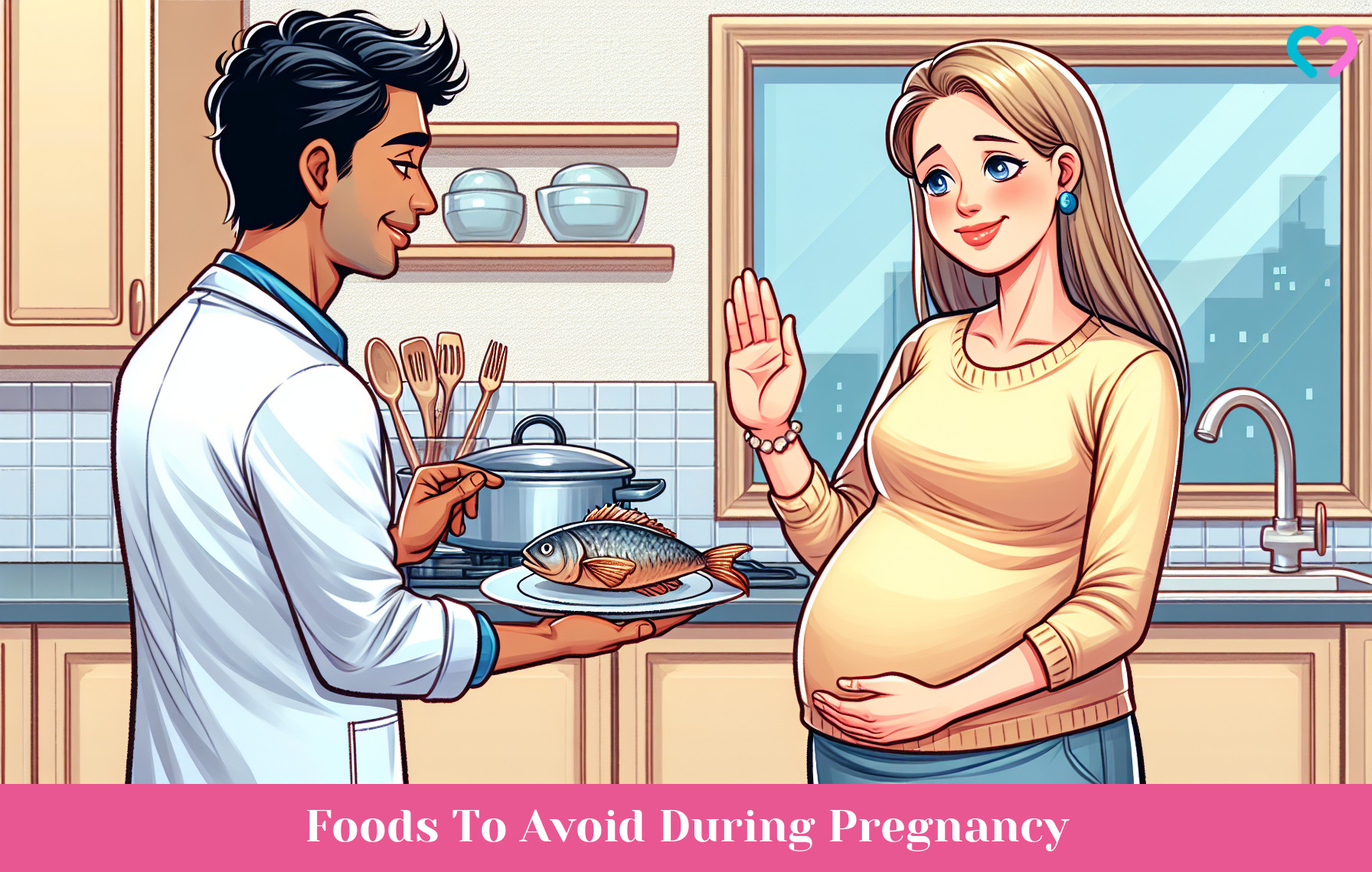
Image: Dall·E/MomJunction Design Team
Avoid processed meals, alcohol, and caffeine when pregnant. Instead, prioritize a diet rich in fresh fruits and vegetables, lean meats, and whole grains to ensure a healthy pregnancy.
Personal Experience: Source
MomJunction articles include first-hand experiences to provide you with better insights through real-life narratives. Here are the sources of personal accounts referenced in this article.
i. The First Trimester.https://linhandjon.wordpress.com/2011/02/10/the-first-trimester-2/
References
- Mercury in fish.
https://www.betterhealth.vic.gov.au/health/healthyliving/mercury-in-fish - Pregnancy and fish: What’s safe to eat?
https://www.mayoclinic.org/healthy-lifestyle/pregnancy-week-by-week/in-depth/pregnancy-and-fish/art-20044185 - Carolyn Tam et al.; (2010); Food-borne illnesses during pregnancy.
https://www.ncbi.nlm.nih.gov/pmc/articles/PMC2860824/ - People at Risk: Pregnant Women.
https://www.foodsafety.gov/people-at-risk/pregnant-women#_Only_Consume_Cooked - Food Safety: For Pregnant Women Their Unborn Babies and Children Under Five.
https://www.fda.gov/media/83740/download - Prevention.
https://www.cdc.gov/listeria/prevention.html - The Dangers of Raw Milk: Unpasteurized Milk Can Pose a Serious Health Risk.
https://www.fda.gov/food/buy-store-serve-safe-food/dangers-raw-milk-unpasteurized-milk-can-pose-serious-health-risk - While Pregnant Be Careful with Queso Fresco.
https://www.cdc.gov/listeria/pdf/hispanic-pregnant-women-soft-cheese-factsheet-508c.pdf - Fruits, Veggies and Juices- Food Safety for Moms to Be.
https://www.fda.gov/food/people-risk-foodborne-illness/fruits-veggies-and-juices-food-safety-moms-be - Supinda Bunyavanich et al.; (2014); Peanut milk and wheat intake during pregnancy is associated with reduced allergy and asthma in children.
https://www.ncbi.nlm.nih.gov/pmc/articles/PMC4004710/ - Edmund Hey; (2007); Coffee and pregnancy.
https://www.ncbi.nlm.nih.gov/pmc/articles/PMC1804190/ - Carol Louik et al.; (2010); Use of Herbal Treatments in Pregnancy.
https://www.ncbi.nlm.nih.gov/pmc/articles/PMC2867842/ - Mom’s Exposure to BPA During Pregnancy May Put Her Baby on Course to Obesity.
https://www.publichealth.columbia.edu/news/moms-exposure-bpa-during-pregnancy-may-put-her-baby-course-obesity - Pregnant? Tuna May Not Be Safe To Eat.
http://healthcare.utah.edu/healthfeed/postings/2014/08/082914_article-tuna-while-pregnant - Managing your weight gain during pregnancy.
https://medlineplus.gov/ency/patientinstructions/000603.htm - Trans Fats.
https://www.heart.org/en/healthy-living/healthy-eating/eat-smart/fats/trans-fat - Eliza Pope et al.; (2014); Sugar substitutes during pregnancy.
https://www.ncbi.nlm.nih.gov/pmc/articles/PMC4229159/ - Vitamins A E and K.
https://www.ncbi.nlm.nih.gov/books/NBK235251/ - Water-Soluble Vitamins.
https://www.ncbi.nlm.nih.gov/books/NBK235220/ - Tabia Volqvartz et al.; (2019); Use of alternative medicine ginger and licorice among Danish pregnant women – a prospective cohort study.
https://bmccomplementmedtherapies.biomedcentral.com/articles/10.1186/s12906-018-2419-y - Pregnancy and food safety.
https://www.foodauthority.nsw.gov.au/consumer/life-events-and-food/pregnancy/pregnancy-and-food-safety?utm_campaign=redirected - Foods to avoid in pregnancy.
https://www.nhs.uk/pregnancy/keeping-well/foods-to-avoid/ - Ann M. Vuong et al.; (2016); Prenatal Exposure to Nitrosatable Drugs Dietary Intake of Nitrites and Preterm Birth.
https://academic.oup.com/aje/article/183/7/634/2195930 - Say No to Raw Dough.
https://www.cdc.gov/foodsafety/communication/no-raw-dough.html - Gender positions and cravings in pregnancy: truth or myth.
https://www.nct.org.uk/pregnancy/worries-and-discomforts/common-discomforts/gender-positions-and-cravings-pregnancy-truth-or-myth - Debosree Ghosh and Suvendu Ghosh; (2018): Forbidden Foods for Healthy Pregnancy.
https://www.researchgate.net/publication/328513110_Forbidden_Foods_for_Healthy_Pregnancy - Pregnancy Heartburn? 7 Ways to Get Relief.
https://intermountainhealthcare.org/blogs/pregnancy-heartburn-7-ways-to-get-relief/





